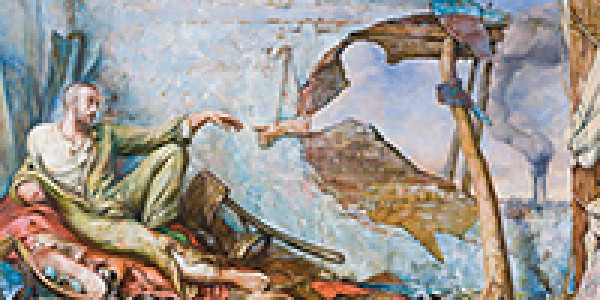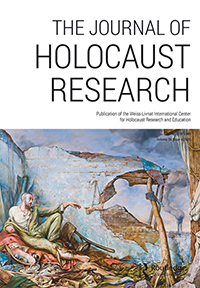The Journal of Holocaust Research, Volume 34, Issue 4 (2020)
Interrogating Evil: A Special Issue of the Journal of Holocaust Research for Lawrence L. Langer on His Ninetieth Birthday
06/10/2020 | Na stronie od 23/11/2020

From: The Journal of Holocaust Research
- Introduction Gabriel N. Finder, Dawn Skorczewski & Dan Stone
- My Life with Holocaust Death
Lawrence L. Langer - Holocaust Testimonies: Problems Analyzed, Promises Fulfilled
Joanne Weiner Rudof - ‘Consider If’: Levi, Langer, Agamben, and the Unthinkable
Jennifer L. Geddes - ‘The Detours Required’: Sarah Kofman and the ‘Black Milk’ of Hidden Children
Sara R. Horowitz - ‘Disrupted Narratives’: Lawrence Langer’s Explorations of Deep Memory in Holocaust Testimonies
Noah Shenker - ‘I Was a Tape Recorder. I Was a Mailing Box.’: Jan Karski’s Interviews
Dawn Skorczewski & Dan Stone - Un-American? Or Just ‘Inglourious’? Reflections on the ‘Americanization of the Holocaust’ from Langer to Tarantino
Barry Langford - ‘A Horrific Impression of Jewish Martyrdom’: Regarding Extermination of Polish Jews: Album of Pictures
Gabriel N. Finder

Aims and scope
The Journal of Holocaust Research is a peer-reviewed bilingual (English and Hebrew) scholarly journal devoted to interdisciplinary study of the Holocaust, its origins and aftermath. The journal is published four times a year through the cooperation of the Weiss-Livnat International Center for Holocaust Research and Education at the University of Haifa, the Ghetto Fighters’ House Museum, and Routledge, part of the Taylor & Francis Group.
The Journal of Holocaust Research aims to promote research and study of the various aspects of the Holocaust and antisemitism and to create a platform through which our readers may access the most recent, innovative work being conducted in various disciplines and in different countries. Intended for a diverse academic audience, the journal publishes a wealth of articles, research forums, and special issues that connect scholars from around the world in a meaningful discourse about the Holocaust.
We welcome articles using different approaches and methodologies on all aspects of Holocaust research, including:
- Nazi policies against the Jews and other racial and genocidal programs
- Jewish responses to Nazism
- Nazi propaganda
- Ghettos and camps
- European collaboration
- War crimes trials
- Survivor testimony
- Collective memory of the Holocaust
- Commemoration and museology
- World War II and its aftermath
- "New" antisemitism and xenophobia in the world today
- Holocaust literature, drama, film, and art
- Psychological aspects of trauma
- Technology and the Holocaust
Journal information
Print ISSN: 2578-5648 Online ISSN: 2578-5656, 4 issues per year
The Institute for Holocaust Research, at the University of Haifa and our publisher Taylor & Francis make every effort to ensure the accuracy of all the information (the "Content") contained in our publications. However, The Institute for Holocaust Research, at the University of Haifa and our publisher Taylor & Francis, our agents, and our licensors make no representations or warranties whatsoever as to the accuracy, completeness, or suitability for any purpose of the Content. Any opinions and views expressed in this publication are the opinions and views of the authors, and are not the views of or endorsed by The Institute for Holocaust Research, at the University of Haifa and our publisher Taylor & Francis. The accuracy of the Content should not be relied upon and should be independently verified with primary sources of information. The Institute for Holocaust Research, at the University of Haifa and our publisher Taylor & Francis shall not be liable for any losses, actions, claims, proceedings, demands, costs, expenses, damages, and other liabilities whatsoever or howsoever caused arising directly or indirectly in connection with, in relation to, or arising out of the use of the Content. Terms & Conditions of access and use can be found at http://www.tandfonline.com/page/terms-and-conditions .
Publication history
Currently known as: The Journal of Holocaust Research (2019 - current)
Formerly known as Dapim: Studies on the Holocaust (2009 - 2018)